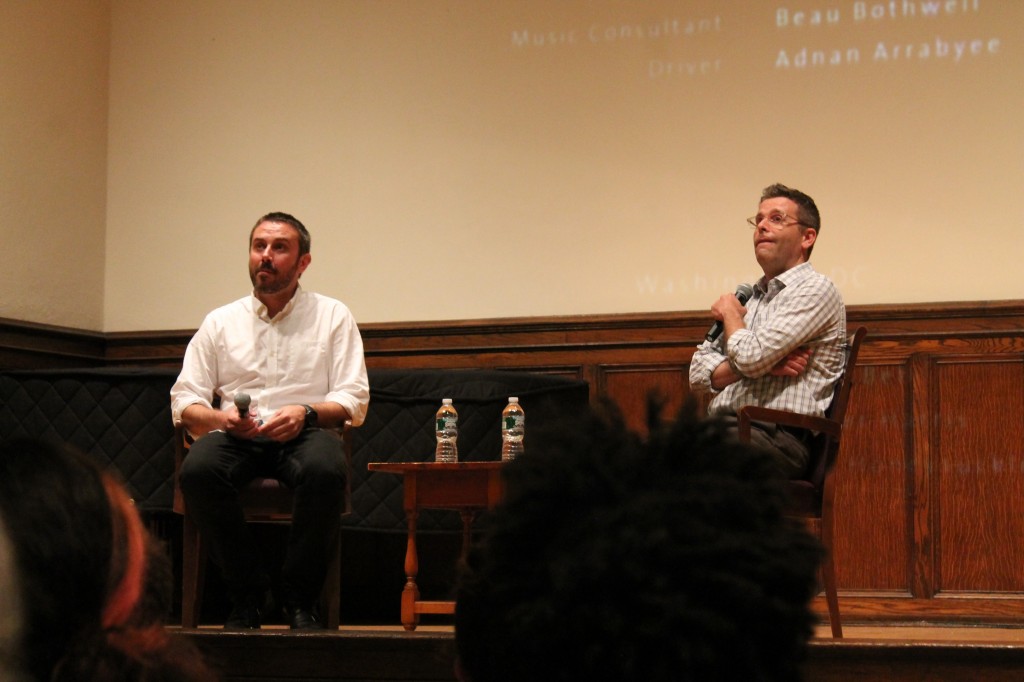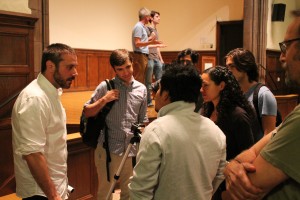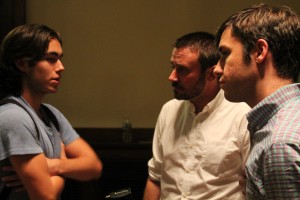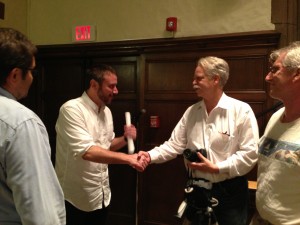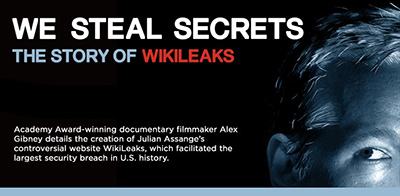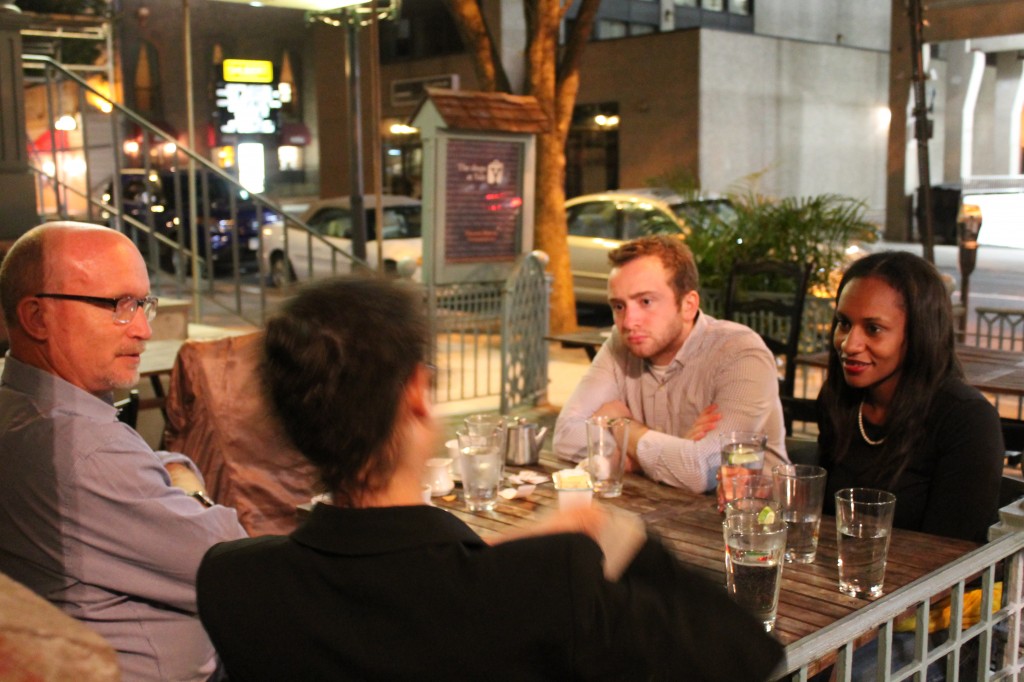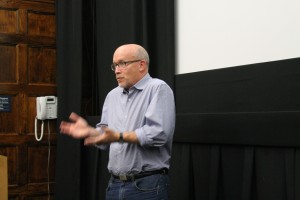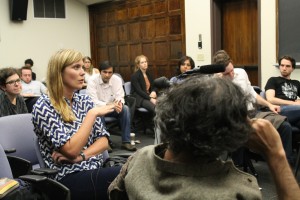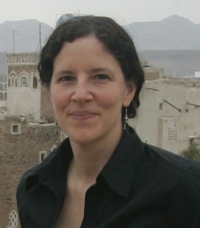Now about Laura Poitras. She is one of the most extraordinary people I have ever had the pleasure to meet. She has gotten some attention recently in the New York Times Sunday Magazine in Peter Mass’s cover article “How Laura Poitras Helped Snowden Spill His Secrets.”
One thing the article failed to mention was that Laura taught at Yale where all the adoring students in her class agreed that her course was “excellent.” (That is 5 out of 5.) Shockingly the university defunded the position in the midst of its budgetary crisis and I had to take over from her. It was painful but someone has to keep the course going and keep the slot occupied until the position is refunded–and Laura can come back to refill it. Who knows if that will happen now. Of course, I hope that it will. In any case, I loved the photo that the NYT published of her. It captures a certainly soulful serenity that is such an important part of who she is (or am I just reading this into the photo). Well you can decide:
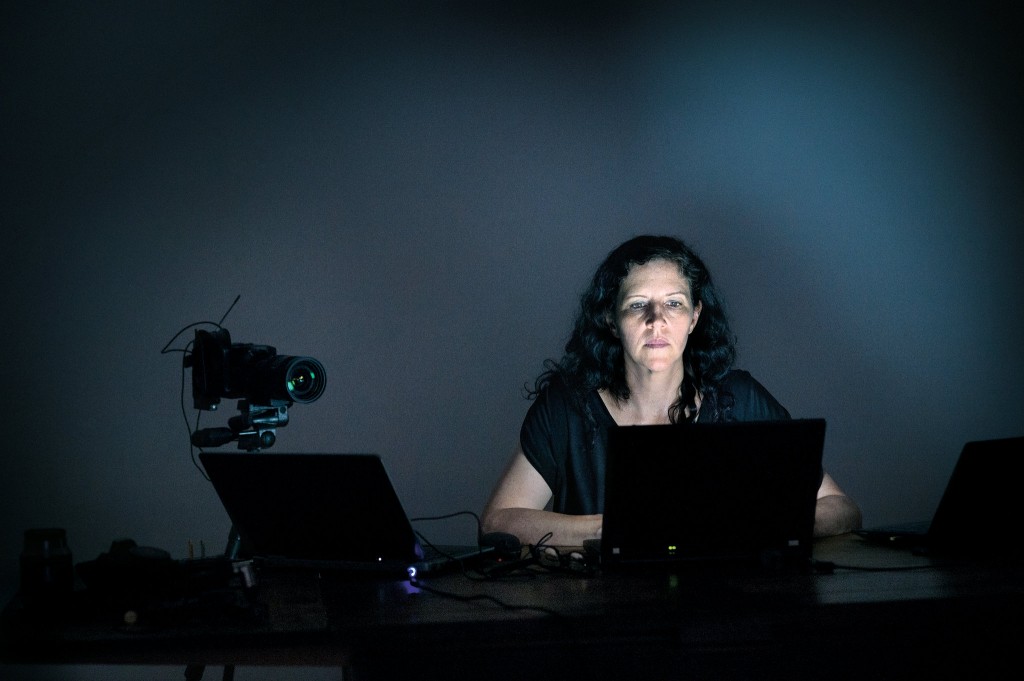 Meanwhile Jeremey Scahill came to Yale to screen Dirty Wars as part of the new Windham Campbell Prizes Festival. I was just fortunate that Michael Kelleher let me piggyback this particular event onto the series I put together.
Meanwhile Jeremey Scahill came to Yale to screen Dirty Wars as part of the new Windham Campbell Prizes Festival. I was just fortunate that Michael Kelleher let me piggyback this particular event onto the series I put together.
Dirty Wars is a powerful, rigorous film that reveals the hidden brutality and indifference of a imperialist government which has become dangerous arbitrary and arrogant. In a way it is a compelling reinvention of classic TV documentary report in which a producer works with a reporter on a story. Scahill is that reporter and Richard Rowley is the producer. The documentary’s brutal account is balanced by Scahill’s photogenic qualities. His eyes somehow manage to communicate the complex history of what he has seen and experienced.
After the screening, in a powerful speech before the Q & A, Scahill began by expressing his gratitude for the week-long series of events. Then he condemned the university’s readiness to hire General McCrystal whom he characterized as a war criminal.
Here are a few photos from last night (Sept 12th):
After the event was over I handed Jeremy Scahill a copy of the “It’s All Classfied” poster and asked him what he thought was in store for Laura Poitras.
As it turns out, he is working with her––a fact that would soon be in the newspapers. He thinks she’ll be back to show her amazing documentary at high profile film festivals. But which ones? And what will happen when she enters the country? Anyway, her much awaited documentary provides the structuring absence for this series.
***
Next up was Alex Gibney with We Steal Secrets: The Story of Wikileaks (2013), which is an extraordinary film. A Yale graduate, Alex has screened his films here over the years and has received our Film Studies Program Award––in fact he notified and accepted it the same day he received his Oscar for Taxi to the Dark Side (2007)–but early enough in the day so that he knew he’d won something that day–and our award proved to be the warm up and perhaps good luck charm. I’ve been watching his films whenever and wherever possible: Yale, Full Frame Documentary Film Festival, Stranger Than Fiction, and the local Criterion theater where his documentary The Armstrong Lie will be playing Thanksgiving Week.
Alex came up to Yale to show We Steal Secrets. As is often the case, a few of us saw the film beforehand and then took Alex to dinner while the film was screening.
Alex’s films keep getting more complex and sophisticated. And they keep getting better. I was so impressed by Client 9 and his ability to get Eliot Spitzer to talk–and also the solution for filming an interview with one of his prostitutes who would not talk–using an actress to perform/reenact her interview. 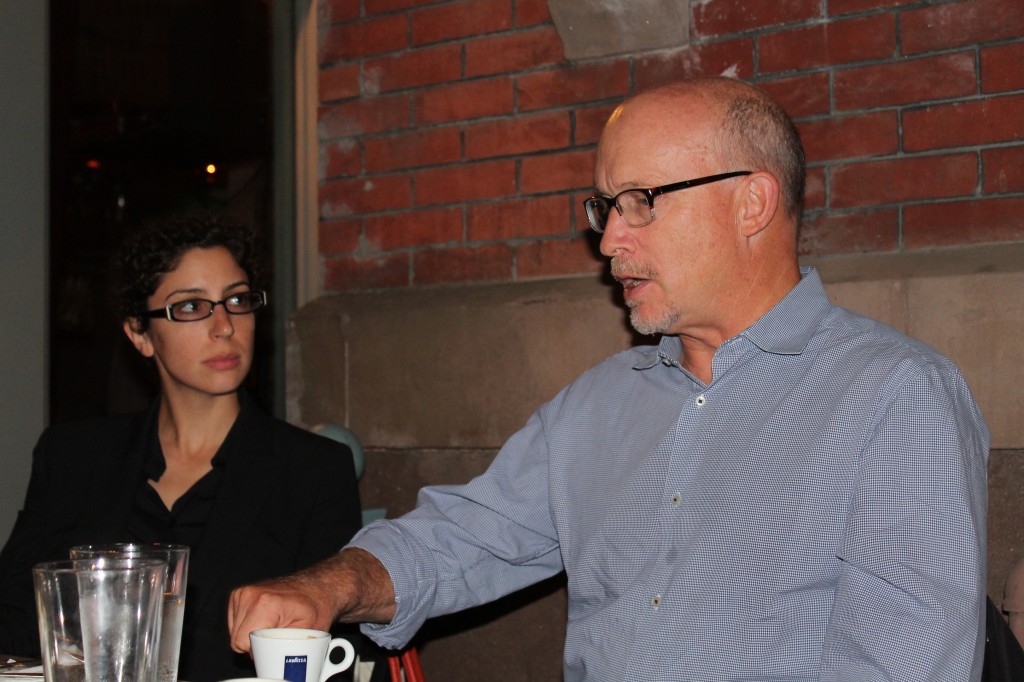 This mastery certainly continued to develop in the case of We Steal Secrets: The Story of Wikileaks, which I found extremely illuminating on a practical level. It documented Julian Assange’s past–how he cut his teeth in Australia as a young hacktivist and clarified other issues that have gotten lost in the politics. This would include the incident involving two Swedish women with whom he had a night of hot sex. Assange has certainly been in the news, but his story as well as the Chelsea/Bradley Manning and WikiLeaks narrative has been largely lost in the claims and counter claims of any given moment.
This mastery certainly continued to develop in the case of We Steal Secrets: The Story of Wikileaks, which I found extremely illuminating on a practical level. It documented Julian Assange’s past–how he cut his teeth in Australia as a young hacktivist and clarified other issues that have gotten lost in the politics. This would include the incident involving two Swedish women with whom he had a night of hot sex. Assange has certainly been in the news, but his story as well as the Chelsea/Bradley Manning and WikiLeaks narrative has been largely lost in the claims and counter claims of any given moment. In any case, while Spitzer decided that it was better to talk with Gibney than for Alex to make a film where he refused to cooperate, Assange came to the opposite conclusion. Not surprising perhaps, given Assange’s (often justified) paranoia, Gibney’s challenge was to construct a coherent, insightful and in some real sense objective/balanced account while finding innovative solutions to the fundamental problem of making a film about two people who would not (Assange) or cannot (Manning) talk to him. Gibney writes and speaks the narration–in a way that gives the film a personal voice. However, he does not appear in the film. Rather, he has a stand-in or counter-part of sorts, a filmmaker who did have considerable access to
In any case, while Spitzer decided that it was better to talk with Gibney than for Alex to make a film where he refused to cooperate, Assange came to the opposite conclusion. Not surprising perhaps, given Assange’s (often justified) paranoia, Gibney’s challenge was to construct a coherent, insightful and in some real sense objective/balanced account while finding innovative solutions to the fundamental problem of making a film about two people who would not (Assange) or cannot (Manning) talk to him. Gibney writes and speaks the narration–in a way that gives the film a personal voice. However, he does not appear in the film. Rather, he has a stand-in or counter-part of sorts, a filmmaker who did have considerable access to 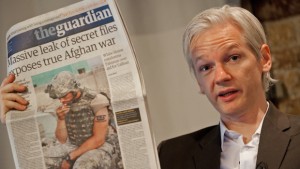 Assange for many years: Aussie filmmaker Mike Davis. And if Assange and Manning don’t talk to Gibney, Adrian Lamo does. Former hacktivist Lamo was the person Manning trusted with his life, and Lamo turned him in to the Feds. (His exposure was not due to some tell-tale flaw involving WikiLeaks as I had somehow assumed.) Lamo is a tragic and pathetic villain in this film even as Manning is the tragic and vulnerable hero. Assange is something else––flawed, brilliant, charismatic, paranoid, self-obsessed, often heroic and more often self-destructive. Revealing this ambiguity is one of the film’s most profound achievements.
Assange for many years: Aussie filmmaker Mike Davis. And if Assange and Manning don’t talk to Gibney, Adrian Lamo does. Former hacktivist Lamo was the person Manning trusted with his life, and Lamo turned him in to the Feds. (His exposure was not due to some tell-tale flaw involving WikiLeaks as I had somehow assumed.) Lamo is a tragic and pathetic villain in this film even as Manning is the tragic and vulnerable hero. Assange is something else––flawed, brilliant, charismatic, paranoid, self-obsessed, often heroic and more often self-destructive. Revealing this ambiguity is one of the film’s most profound achievements.
Perhaps it is not entirely surprising that Assange denounced the film sight unseen, given his refusal to cooperate in its making. However the film has been attacked by others who should know better, including Chris Hedges at TruthDig. In an article “We Steal Secrets: State Agitprop,” he claims that the film “interprets acts of conscience and heroism by Assange and Manning as misguided or criminal.” This does not seem to be the case. Certainly Gibney demythologizes Assange but he is hardly on the side of NSA (National Security Agency––which does not mean he won’t speak to them). The Hollywood Reporter has recently reported:
While Gibney first dismissed Assange and WikiLeaks’ attacks on his film, he now believes it did have an affect on the film’s box-office performance. Released by Focus Features in May, it grossed just $166,243, never playing in more than 24 theaters. “It was more effective than I thought,” Gibney said. “He caused preemptively a lot of people not to see it, which when you think about it is kind of ironic. Instead of saying, ‘Go see this film and then read my commentary,’ it was, ‘Don’t see this film.’ Not exactly the transparency agenda.
Gibney has just responded with a detailed response to Assange’s critique of We Steal Secrets, which was based on an incomplete transcript of an outdated version of the film),. It is entitled “The WikiLeaks Organization’s Annotated Transcript, with Response from the Filmmakers.” Warning: Be careful about printing the response. It is over 260 pages!
Louisa de Cossy kindly videotaped the Q & A, which is posted here:
Finally I asked Alex about Laura Poitras. Turns out that they were both at Julian Assange’s 40th birthday party. To some degree, they were competing for his attention and cooperation. In the end, she was successful while he was not. However, it meant that Alex used these limitations to make a fascinating film. Adversity can truly be the mother of adversity. Moreover, with the emergence of Edward Snowden, Assange may have a much smaller role to play in Laura’s forthcoming film.
Alex also remembered running into Laura on the security line at the airport. She warned him that she would be taken aside and extensively searched and so he should not wait for her. Of course, Laura was right.
***
Robb Moss had to postpone, which may have been just as well. It was a frantic week in New Haven as well.
***


